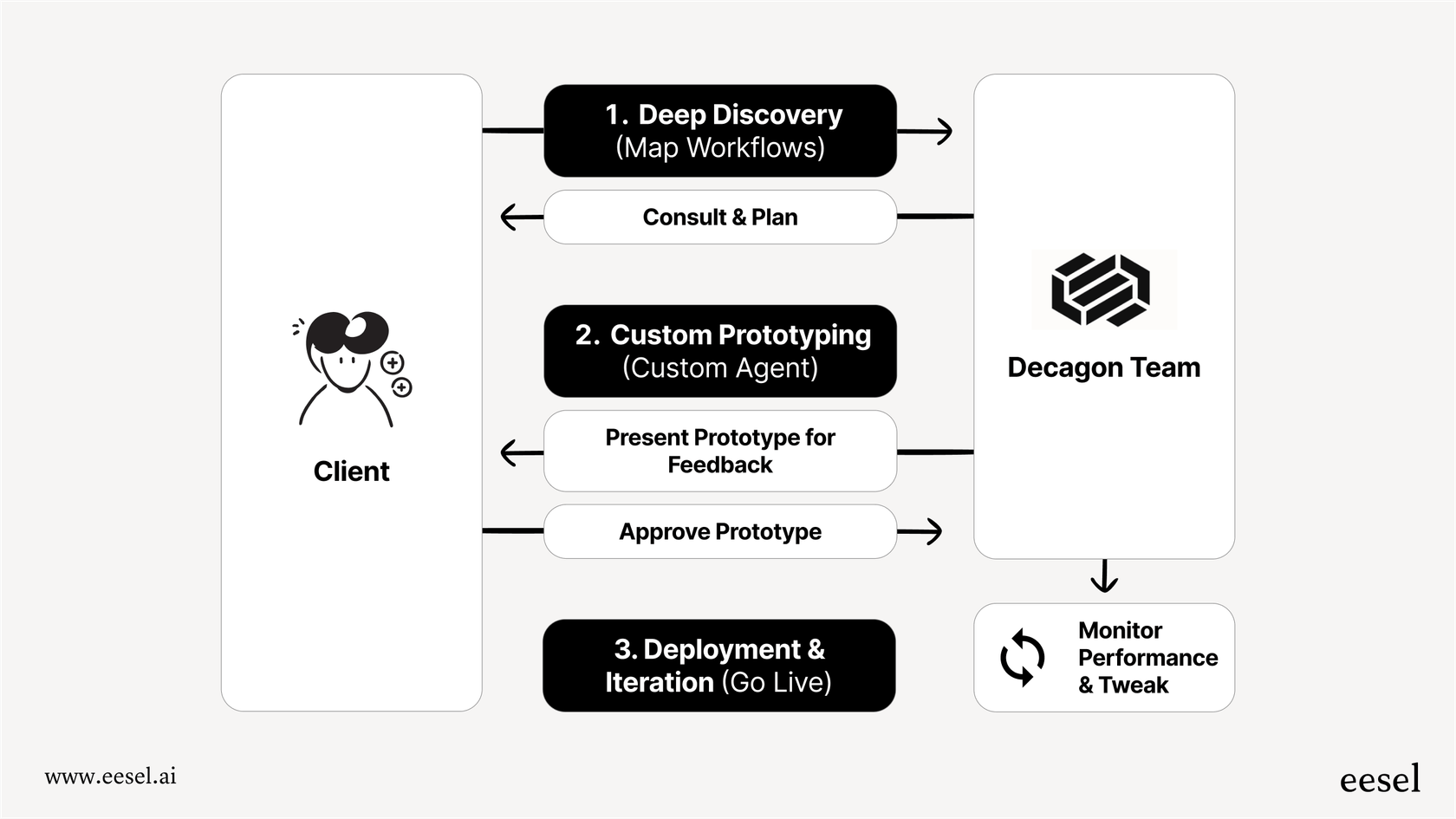
AI agents are getting a lot of hype for their potential to turn customer support from a cost center into a growth driver. Companies are looking past simple chatbots and want AI that can actually solve tricky customer problems on its own. Decagon has made a name for itself in this space, building custom, heavy-duty AI agents for big companies, especially in the fintech world.
But their hands-on, engineering-focused approach comes with a hefty price tag. Is it the right call for every team? This Decagon review will walk you through its features, common uses, and what it’s like to work with them, so you can make an informed decision. We’ll look at what it’s good at, where it misses the mark, and whether a more accessible, self-serve tool like eesel AI might be a better fit for your needs.
Why do a Decagon review?
Decagon doesn’t sell simple chatbots. They position themselves as a platform for deploying fully autonomous AI agents that can handle entire customer support workflows. These agents plug into a company's internal APIs and databases to do things like verify accounts, process payments, and give personalized advice.
The whole system is built around what they call the AI Agent Engine, which is basically a constant feedback loop that includes:
-
A core AI agent: This is the main point of contact for customers via chat, email, or phone.
-
Intelligent routing: It knows when to pass a conversation to a human.
-
Agent assist: It acts as a copilot for human agents, feeding them real-time suggestions.
-
Quality assurance: An admin dashboard helps you keep an eye on performance and tweak how the agent behaves.

This setup is designed for deep, custom integrations and is really meant for large businesses with plenty of tech resources. Getting it up and running often means having dedicated "Agent Engineers" (a role Decagon promotes) to build and look after the system. It’s less of a plug-and-play software and more of a close partnership.
Decagon review: AI specs at a glance
| Criteria | Decagon AI |
|---|---|
| Pricing | $95,000 – $590,900+ per year (custom quote) |
| Pricing Model | Per-conversation or per-resolution |
| Key Features | Autonomous AI agents, bespoke workflows, API actions, agent assist, analytics |
| Ideal User | Large enterprises (especially in Fintech) with large budgets and engineering teams |
| Implementation | High-touch, requires dedicated “Agent Engineers” for setup and maintenance |
| Integrations | Custom API integrations, deep backend system connections |
A detailed Decagon review: Breaking down the platform
To give you a clear picture, we'll look at Decagon based on what matters most to support leaders: its features and uses, the setup experience, and whether it's worth the money.
Use cases and features in this Decagon review: What can it actually do?
Decagon really shines when it comes to handling complex, industry-specific tasks, particularly in financial services. Their work with companies like Bilt and Rippling shows they can build agents for very specific jobs.
Here are a few key examples:
-
Account Management: Automating things like opening new accounts, updating personal info, and verifying customer identities.
-
Administrative Tasks: Managing cards (activation, replacement), tracking reward points, and helping customers find the right financial forms.
-
"Where is my money?" Queries: Instantly checking on payments, tracking refunds, and giving details on transaction histories.
-
Personalized Product Advice: Suggesting specific products or services based on a user's financial data and activity.

Pros:
-
Great for complex jobs: It can handle multi-step tasks all by itself by connecting directly to a company's internal systems.
-
Industry-specific: It's built to handle the unique rules and security needs of fintech and other regulated fields.
-
Lightens the load for human agents: It can fully solve tricky issues that would normally eat up a lot of an agent's time.
Cons:
-
Overkill for standard support: All that customization is too much for teams who mostly just need to answer questions using their existing help articles and FAQs.
-
Not focused on internal knowledge: The platform is built for customer-facing actions, not for being a go-to internal Q&A tool for your team.
Our Take: Decagon is a beast for businesses that need a custom-built AI team to work with their internal systems. But for most companies, the real win is just making better use of the knowledge they already have. Tools like eesel AI are designed for exactly that. It connects to your help desk, documents, and past tickets to give fast, accurate answers without needing you to bring in a team of engineers.
Decagon review of the setup and user experience: The "Agent Engineer" model
Decagon's setup process is nothing like your typical self-serve tool. They’ve even created new job titles like "Agent Engineer" and "Agent Product Manager," which tells you that setting it up is a big, collaborative project, not a quick configuration.
The process looks something like this:
-
Deep Discovery: Decagon's team works closely with you to map out your complex human workflows.
-
Custom Prototyping: Agent Engineers then build and test a prototype of the agent system.
-
Deployment and Iteration: The agent goes live and is tweaked based on how it performs with real customers.

Pros:
-
A perfectly tailored solution: The final product is built from the ground up for your specific business logic.
-
Expert help: You get a dedicated team of experts building and managing the AI agent for you.
Cons:
-
High barrier to entry: This approach is off the table unless you have a big budget and can spare internal engineers to help out.
-
Slow to show value: The discovery and building phases can take weeks or months, so you’ll be waiting a while to see a return on your investment.
-
You're not in the driver's seat: Support managers and other business users can't easily make changes themselves; they have to rely on engineers for updates.
Our Take: The Agent Engineer model results in a powerful but inflexible system. On the flip side, tools like eesel AI are designed so that business teams can actually run them. Its no-code dashboard lets you connect your knowledge sources, tell the AI how to behave using plain English, and even test it on past tickets before you launch. This lets you get your AI support up and running in hours, not months, without hiring any special roles.
Decagon review of pricing and value for money: Is the investment worth it?
For many businesses, this is the most important part of the review. According to Vendr, the median annual contract for Decagon is around $386,120, with a range from $95,000 to over $590,000.
Their pricing is usually based on one of two models:
-
Per-Conversation: You pay a fee for every chat the AI handles.
-
Per-Resolution: You pay a higher, fixed price for each problem the AI successfully solves.

Pros:
- Huge ROI potential (at a massive scale): For global companies with thousands of support agents, automating a large chunk of complex tickets could make the cost worthwhile.
Cons:
-
Extremely expensive: The price puts Decagon out of reach for small, medium, and even many large businesses.
-
Unpredictable costs: Usage-based pricing can make your monthly bills hard to predict and budget for.
-
Hidden costs: The price tag doesn't account for the internal cost of pulling your own engineers and product managers onto the project.
Our Take: Decagon's price tag makes it clear you're buying a premium, hands-on service. It's an investment in a custom development project. For teams looking for straightforward AI automation, the pricing from eesel AI is a much clearer and more predictable option. With transparent tiers based on interactions and no per-agent fees, you can start automating support for a fraction of the cost and scale without any surprises.
Decagon review summary: A quick comparison
| Feature | Decagon AI | eesel AI |
|---|---|---|
| Ideal User | Global enterprises with large budgets and engineering teams. | SMBs, mid-market, and enterprise teams of all sizes. |
| Pricing | $100k - $600k+ per year (custom quote). | Starts at $239/month. Transparent, interaction-based tiers. |
| Setup | Weeks to months. Requires dedicated "Agent Engineers". | Hours to days. Self-serve, no-code setup. |
| Key Strength | Deep, custom-built workflows and API actions. | Fast, accurate answers from all existing knowledge sources. |
| Flexibility | Rigid. Changes require engineering involvement. | Flexible. Business users can update prompts and sources easily. |
| Value Proposition | A long-term, high-investment AI transformation project. | An accessible, quick-to-deploy tool that enhances your current stack. |
The verdict of our Decagon review: Who is Decagon AI really for?
Decagon is a seriously powerful platform, but it’s for a very specific customer: a large, well-funded company with complicated internal systems that need a completely custom AI solution. If you're in fintech or a similar regulated industry, have a multi-million dollar support budget, and can assign a team of engineers to a months-long project, Decagon could be a great investment.
For everyone else startups, SMBs, mid-market companies, and even enterprise teams that want to stay agile, it's probably more than you need, slower than you'd like, and way over budget. Most businesses don't need to rebuild their systems for AI; they just need AI that works with the tools they already have.
The better alternative post-Decagon review: eesel AI
For teams that need a practical, powerful, and affordable AI support tool, eesel AI is the obvious choice. It’s designed to be a smart layer that sits on top of your existing tools, not a massive new system you have to migrate to.
With eesel AI, you can:
-
Pull answers from everywhere: Train your AI on past tickets, help centers, Confluence, Google Docs, Slack, and over 100 other sources.
-
Go live in minutes: The setup is completely self-serve and doesn't require any code.
-
Pay predictable prices: Our interaction-based pricing has no per-agent fees, so it's affordable and easy to scale.
-
Stay in control: You can easily tweak the AI's tone, behavior, and knowledge from a simple dashboard.
Don't wait on a long, expensive AI project. Book a demo of eesel AI or start a free trial today to see how quickly you can start automating your support.

Frequently asked questions
No, this Decagon review concludes that the platform is not suitable for small businesses or startups. Its high cost, starting at around $95,000 annually, and complex, engineering-heavy setup make it accessible only to large enterprises with significant budgets.
The key takeaway is that Decagon's setup is a long-term, high-touch project, not a simple software configuration. It requires a close partnership and dedicated "Agent Engineers" to build and maintain the system, which can take weeks or months to show value.
According to this Decagon review, Decagon specializes in building custom AI agents that perform complex actions by integrating deeply with a company's backend systems. This is different from simpler AI tools that focus on providing fast, accurate answers from existing knowledge sources like help articles and documents.
This Decagon review identifies the ideal user as a large, well-funded enterprise, especially in regulated industries like fintech. These companies typically have complex internal workflows, multi-million dollar support budgets, and the engineering resources to dedicate to a months-long implementation project.
Share this post

Article by
Kenneth Pangan
Writer and marketer for over ten years, Kenneth Pangan splits his time between history, politics, and art with plenty of interruptions from his dogs demanding attention.






